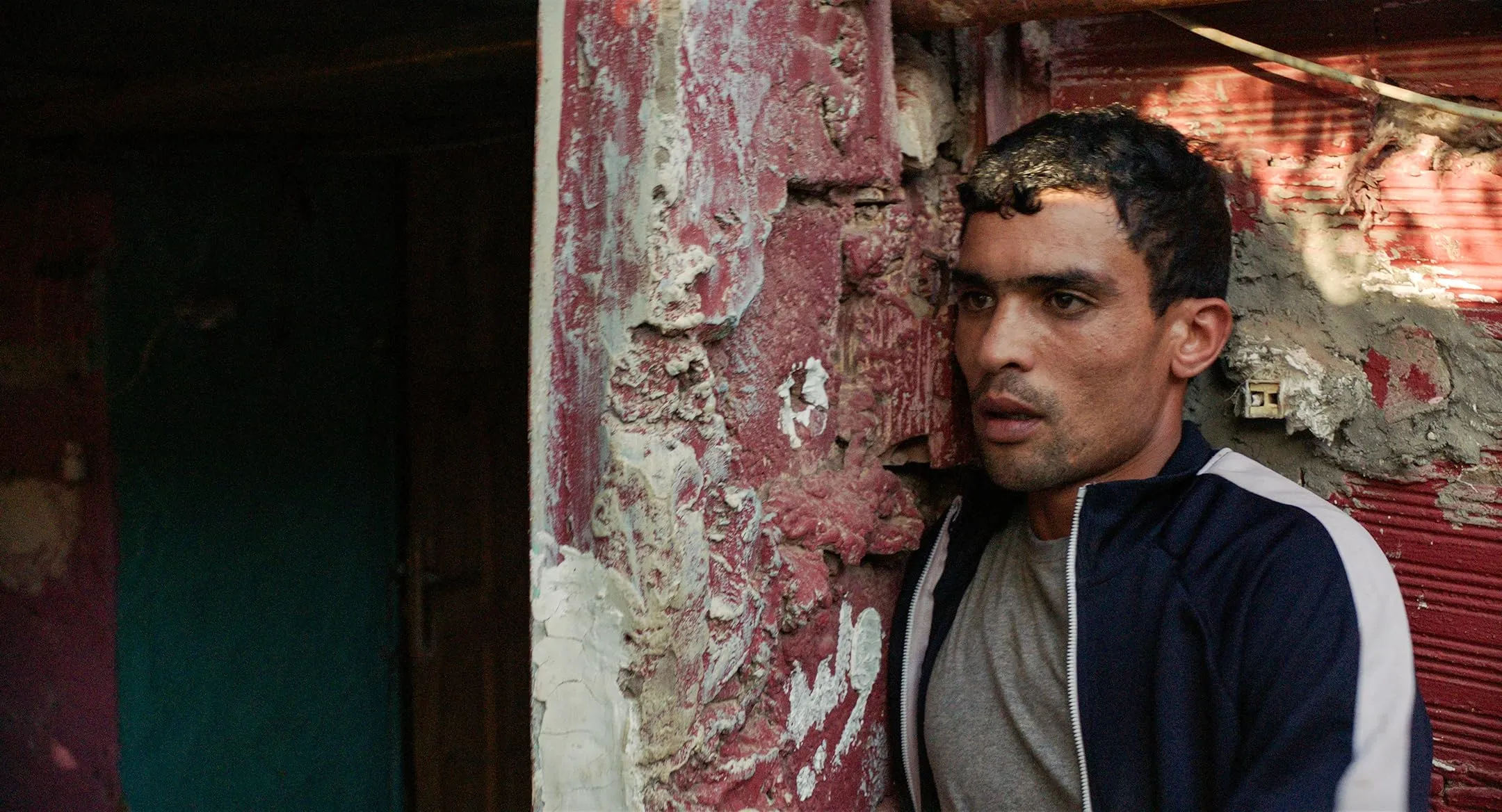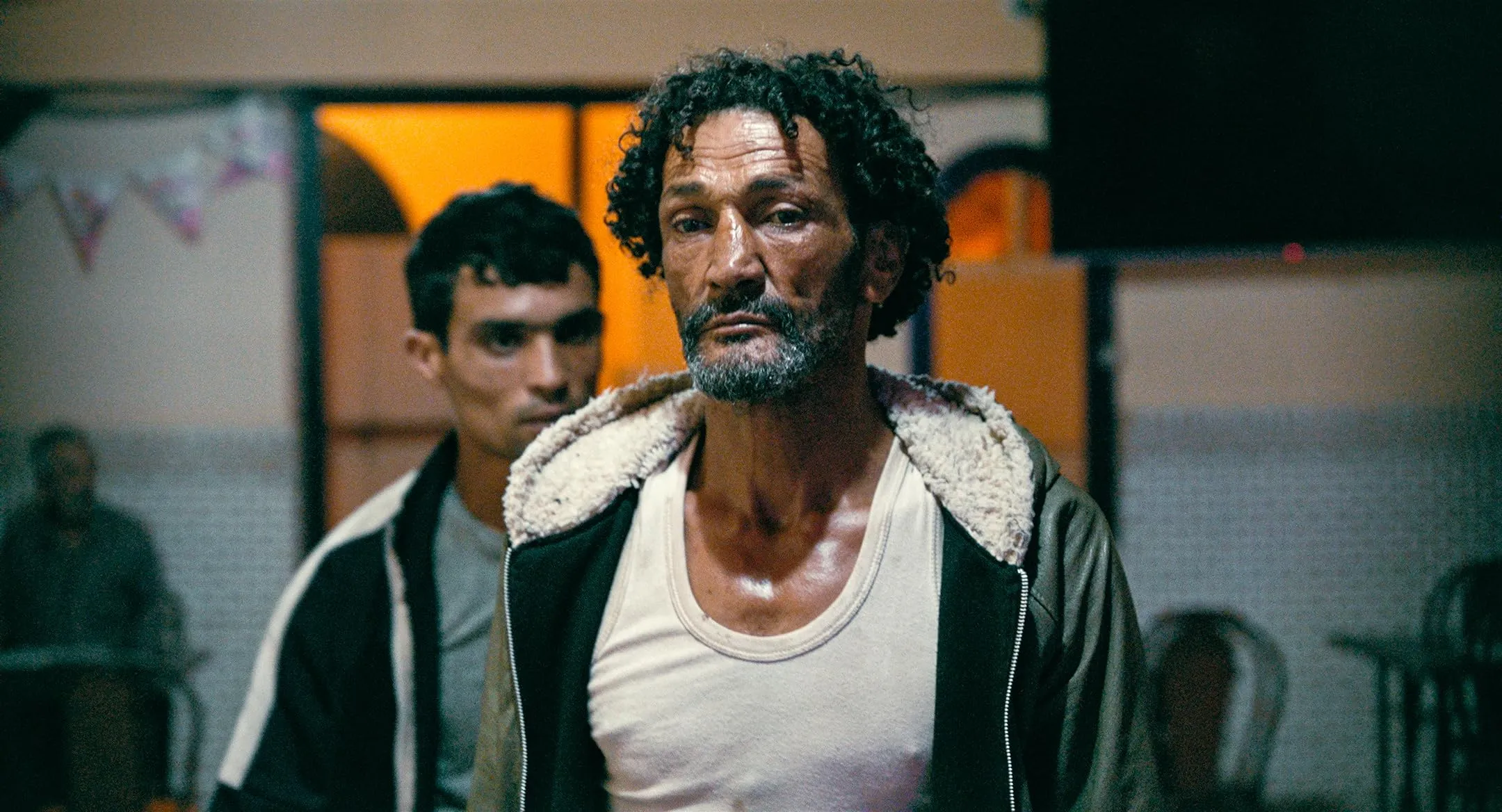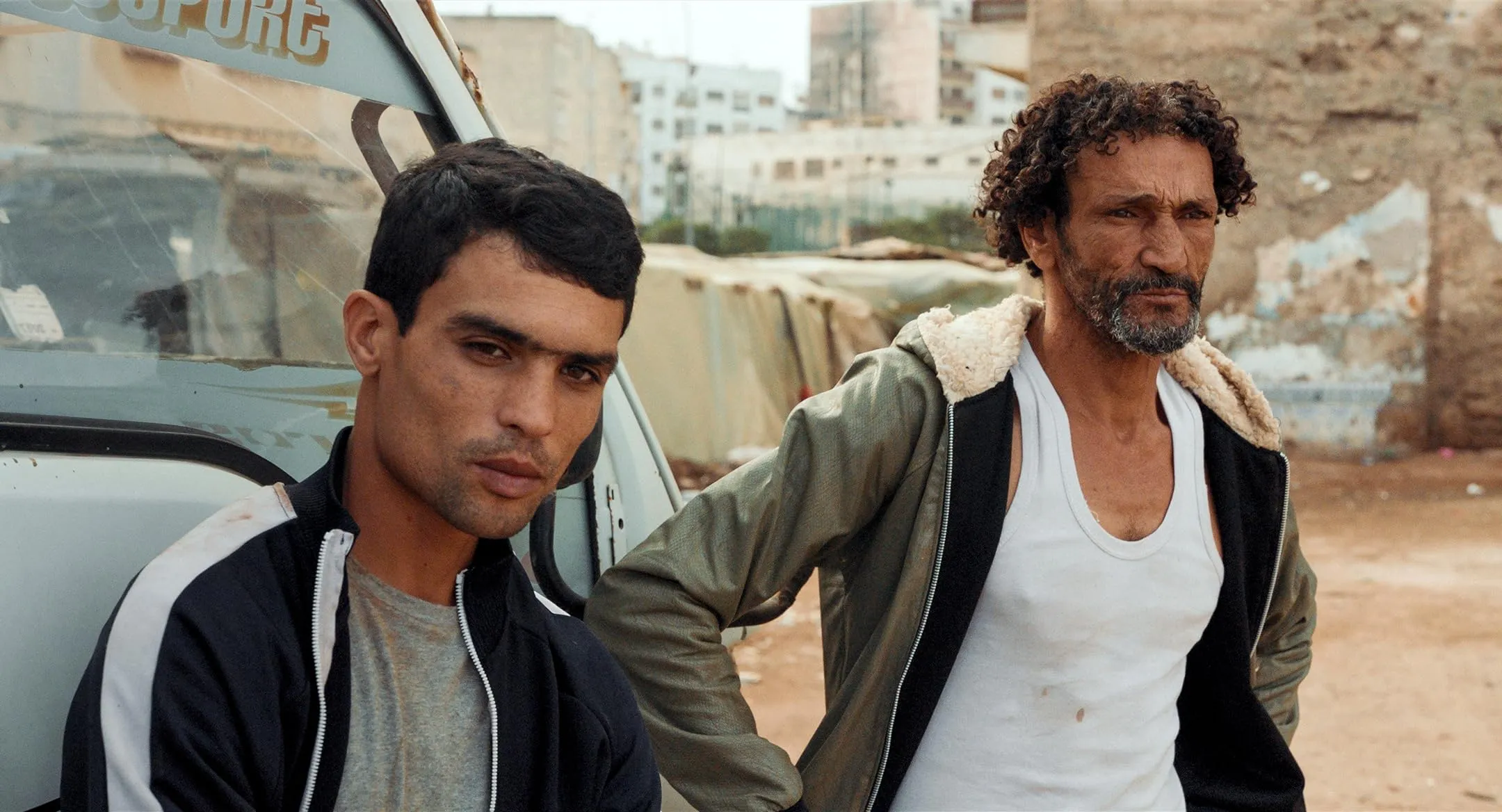Set in the streets of Casablanca, Kamal Lazraq’s acclaimed debut film The Packs immerses viewers in the harrowing night endured by its two central characters. Hassan, a small-time criminal, finds himself in deeper trouble than expected when a job kidnapping a rival goes wrong. Now saddled with a dead body, he and his son Issam must find a way to dispose of it under cover of darkness, with danger lurking around every corner.
We meet Hassan as a man accustomed to living on the margins. Though he assists a local gang leader, his position remains precarious. When his boss seeks violent retaliation for a wrong, Hassan has little choice but to carry out the deed. Yet what begins as a simple task spirals out of control, plunging Hassan and the reluctant Issam into an ordeal that tests their bond and puts their lives at risk.
With minimal resources and dwindling options, father and son traverse Casablanca under concealing night shadows. Each location they seek for burial brings new threats, tightening the noose as dawn and discovery loom closer. Through it all, simmering social tensions loom beyond their desperate situation, underscored by the gangland clashes that set their nightmare in motion.
Crafted with authenticity and intensity, The Packs offers a visceral depiction of its characters’ nightlong crusade. Driven by raw performances from its non-professional leads, Lazraq’s debut shines a revealing light on the harsh realities and complex social dynamics of his native city, seen through the lens of one fateful night when two men’s resolve is pushed to its breaking point.
The Night’s Harried Pursuit
We’re drawn into Kamal Lazraq’s gritty world from the start. Hassan finds himself in a brutal dogfight between local gangs. When his canine ally falls, the loss damages Hassan’s fragile standing. So when his boss Dib demands retribution, Hassan has little choice but to act.
He recruits his son Issam to help with the task—kidnapping a rival. But Hassan lacks his son’s level head. Where Isaac sees danger, his father rushes in. They bungle the job, and their victim winds up dead in the back of their car.
Now father and son embark on a desperate nightlong quest to dispose of the body undetected. As low-level players in Casablanca’s criminal circuit, they understand the consequences should Dib discover their failure.
We soon see Hassan operate on frayed nerves. Pushing through fear and uncertainty, he drives their pursuit with flickering plans. But each hasty idea leads only to more tight spots.
Issam proves the wiser partner. Where his father pushes, Issam pulls back, advising caution yet bolstering Hassan with his steady temperament. An unspoken care for one another lies beneath their fraught exchanges.
Their underground world comes alive around them. Fellow criminals decline involvement, while regular folk shoo them off in distrust. As shadows cloak their grim errand, the city itself seems to work against their aim.
By night’s end, father and son will have navigated close shaves, frayed trust, and difficult realizations. Through it all, their bond endures the pressure, scorched but unbroken even in the face of a trial that burns through the black hours.
Masterfully Crafted Intimacy
Kamal Lazraq puts his directorial talents on full display with The Packs. Never does the tension slacken as Hassan and Issam face one daunting obstacle after another. Lazraq keeps you along for the entire desperate ride.
It’s a testament to his skills that non-actors Masstouri and Elaid feel so lived-in as father and son. Their distant unease in early scenes lays the groundwork for the fraught exchanges to come. With minimal dialogue, Lazraq lets simmering emotions speak volumes.
Nightfall casts the city in radical shadows. Yet Lazraq’s camera remains boldly intimate, drawing us deep inside frazzled mental states. Flashes of expression caught in a vehicle’s dim cabin lighting or under sickly orange streetlamps feel startlingly real.
Chases and narrow dodges thrill with their shaky, first-person viewpoint. The handheld style perfectly mirrors Hassan’s constant state of nerviness, like we peer through his panicked, darting eyes. No moment hangs on prolonged shots—the pace stays as breathlessly swift as the characters’ racing thoughts.
Every surroundings yields new nuance under Lazraq’s craftful lens. Alleys that could hide assailants equally conceal our twosome seeking escape. Buildings loom intimidatingly tall over their diminished figures. Even colors bleed new symbolic meaning, from the sinister reds haunting their vision to raking yellows that seem to scrutinize.
Through it all, Lazraq holds intimate focus on the fragile bond between Hassan and Issam. Their anxious dialogues and weighted looks of trust/doubt burrow deeply under your skin.
Testing Bonds in a World of Brutes
Kinship faces trial by fire in Lazraq’s underworld of Casablanca. Hassan and Issam offer a nuanced study of the father-son dynamic under duress.
Hassan embodies an unstable sort of manhood. Living on the periphery, he seizes any opportunity to bolster his fragile status. But his impulsiveness leaves Isaam to mitigate the damage.
The son accepts life’s hardships with greater poise. He watches over Hassan not through duty but with concern. Their relationship holds an intimacy bridging generational gaps.
Among the criminal packs, machismo reigns through shows of force. Leaders like Dib wield power by inflating their dogs—and men—into exaggerated symbols. Once down, arrogance shatters without regard for the fallen.
Issam’s steady head reminds us that strength comes not from dominating others but from protecting one’s own. He shepherds Hassan from a tragic end through compassion, not condemnation.
As the night wears on, we see their bond transform. Faced with new perils, father and son reject past modes like lashing out or abandoning each other. Mutual care supercedes the need to conform to society’s harsh codes.
By the story’s end, what sustains them through a nightmare ordeal is not brute strength alone but the resilience of accepting one’s whole self and having that acceptance returned in kind. Their relationship is tested and emerges shining all the brighter.
Neither Brutes Nor Beggars
Kamal Lazraq’s lens offers a perceptive glimpse into Moroccan society. The Packs interrogates more than just one desperate night—it shines a light on social truths long left in shadow.
On the fringe of Casablanca, tribal mentalities hold sway. “Proving” oneself through brazen acts of violence or domination passes for valor in some circles. But this way of life proves as fragile as the brittle egos propping it up.
Away from the flashy fights and posturing, humanity endures in humbler forms. Hassan and Issam may operate in the criminal circuit out of necessity rather than nature. Their bond is tested not by codes of machismo but by caring for one another.
This subtle portrayal suggests a world more complex than outsiders often see. Marginalized communities contain multitudes—defying reduction to brute or beggar, villain or victim. Individuals remain individuals above all else.
The director sees society not as monolith but as mosaic. Multiple lived realities overlap in a single setting, none fully defining place or people. By shifting focus to humble lives, he illuminates shared qualities that transcend surface divisions.
In Lazraq’s eyes, no man is reducible to his defects or station alone. Something beautiful persists in all, regardless of circumstances, so long as humanity is found where life has led each man.
His debut presents a Morocco of nuance rather than stereotype, inviting viewers into deeper understanding of its textures and truth. Some social mirrors reflect more than may first meet the eye.
Neither Goon Nor Victim
Beneath Lazraq’s lens, Hassan and Issam emerge as far more than superficial archetypes. Masstouri and Elaid bring their characters to life with a depth rarely seen.
Operating purely on instinct, Masstouri’s Hassan resonates with a frantic animal desperation. His every panic-stricken reaction feels unrehearsed—even his poor decisions ring true as impulse over reason. Yet flitting beneath lies paternal love guiding flawed choices.
Elaid, meanwhile, walks a nuanced line between Issam’s care for his father and his own self-preservation. Repressing frustration or fear seems as taxing for the son as supporting his frailer elder. His weighted looks say volumes on the verge of speech.
Between them vibrates an intimacy deeper than familial roles. Their exchanges convey an affinity nurtured through shared trauma rather than genetics alone. Love, doubt, and loyalty meld into fraught exchanges brimming with untold histories.
Through it all, not an iota of artifice exists in these non-actors’ bound performances. Their credible struggles captivate precisely because of vulnerabilities left fully exposed rather than sensationalism.
In Hassan and Issam, Lazraq has created messy, imperfect characters that feel real for their humanity—not in spite of embedded contradictions but because of them. And through Masstouri and Elaid, this complexity comes to thrilling, heartbreaking life.
Hard-Fought Truth in the Darkest of Nights
Kamal Lazraq’s debut feature, The Packs, proves gritty, impactful work. Over the suspenseful course of one fateful night, it navigates complex themes around social bonds, gender norms, and life on the marginalized streets of Casablanca.
Chiefly, the director draws out sophisticated emotive arcs from two compelling non-pro leads. Their relationship transforms from obligation to loyal friendship as external threats force inner reflection. Through it all, shared humanity rises above superficial codes or divisions.
Setting his intimate lens on this ordinary father-son duo, Lazraq casts a revealing light on his hometown’s obscured realities. Violence and corruption exist, yet so do resilience, care, and quests for dignity among those written off as society’s refuse. No man is reducible to surface aspects alone.
While genre thrills maintain suspense, deeper concerns with justice, belonging, and the capacity for good in all people give the story its profound heart. Authenticity drips from each gritty frame, bringing marginalized lives into vivid focus for all viewers regardless of origin.
Though depicting darkness, The Packs ultimately affirms our shared potential for empathy, connection, and personal growth even in the most desperate of circumstances. It leaves us not with answers but determined questioning—an impact that will linger long after its tour de force conclusion fades to dawn.
The Review
Hounds
With empathetic storytelling and raw performances, Kamal Lazraq's debut feature, The Packs, proves a sophisticated, affecting work. It draws global audiences into an intimate understanding of lives rarely afforded nuanced representation. While depicting grim circumstances, the director's humanistic vision illuminates our shared capacity for resilience, care, and seeking justice.
PROS
- Authentic, gritty atmosphere and performances by non-professional leads
- Builds complex, multi-dimensional characters amidst genre thriller elements
- Examines important social themes like masculinity, justice, and humanity in tough circumstances.
- Filmmaking keeps suspense high throughout while exploring deeper issues.
- Shines light on marginalized communities and lives rarely afforded such representation.
CONS
- Could potentially feel too heavy-handed at times in conveying its social messages.
- May be triggering or uncomfortable for some viewers in the portrayal of violence.
- Ending slightly less suspenseful than the rest of the breathless pace
- Limited female representation




















































Discussion about this post